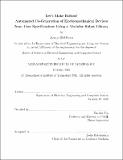| dc.contributor.advisor | Daniela Rus. | en_US |
| dc.contributor.author | DelPreto, Joseph (Joseph Jeff) | en_US |
| dc.contributor.other | Massachusetts Institute of Technology. Department of Electrical Engineering and Computer Science. | en_US |
| dc.date.accessioned | 2016-07-18T19:11:37Z | |
| dc.date.available | 2016-07-18T19:11:37Z | |
| dc.date.copyright | 2016 | en_US |
| dc.date.issued | 2016 | en_US |
| dc.identifier.uri | http://hdl.handle.net/1721.1/103672 | |
| dc.description | Thesis: S.M., Massachusetts Institute of Technology, Department of Electrical Engineering and Computer Science, 2016. | en_US |
| dc.description | This electronic version was submitted by the student author. The certified thesis is available in the Institute Archives and Special Collections. | en_US |
| dc.description | Cataloged from student-submitted PDF version of thesis. | en_US |
| dc.description | Includes bibliographical references (pages [203]-209). | en_US |
| dc.description.abstract | Personalized on-demand robots have a vast potential to impact daily life and change how people interact with technology, but so far this potential has remained largely untapped. Building robots is typically restricted to experts due to the extensive knowledge, experience, and resources required. This thesis aims to remove these barriers with an end-to-end system for intuitively designing robots from high-level specifications. By describing an envisioned structure or behavior, casual users can immediately build and use a robot for their task. The presented work encourages users to treat robots for physical tasks as they would treat software for computational tasks. By simplifying the design process and fostering an iterative approach, it moves towards the proliferation of on-demand custom robots that can address applications including education, healthcare, disaster aid, and everyday life. Users can intuitively compose modular components from an integrated library into complex electromechanical devices. The system provides design feedback, performs verification, makes any required modifications, and then co-designs the underlying subsystems to generate wiring instructions, mechanical drawings, microcontroller code for autonomous behavior, and user interface software. The current work features printable origami-inspired foldable robots as well as general electromechanical devices, and is extensible to many fabrication techniques. Building upon this foundation, tools are provided that allow users to describe functionality rather than structure, simulate robot systems, and explore design spaces to achieve behavioral guarantees. The presented system allows non-engineering users to rapidly fabricate customized robots, facilitating the proliferation of robots in everyday life. It thereby marks an important step towards the realization of personal robots that have captured imaginations for decades. | en_US |
| dc.description.statementofresponsibility | by Joseph DelPreto. | en_US |
| dc.format.extent | 209 pages | en_US |
| dc.language.iso | eng | en_US |
| dc.publisher | Massachusetts Institute of Technology | en_US |
| dc.rights | M.I.T. theses are protected by copyright. They may be viewed from this source for any purpose, but reproduction or distribution in any format is prohibited without written permission. See provided URL for inquiries about permission. | en_US |
| dc.rights.uri | http://dspace.mit.edu/handle/1721.1/7582 | en_US |
| dc.subject | Electrical Engineering and Computer Science. | en_US |
| dc.title | Let's make robots! : automated co-generation of electromechanical devices from user specifications using a modular robot library | en_US |
| dc.title.alternative | Automated co-generation of electromechanical devices from user specifications using a modular robot library | en_US |
| dc.type | Thesis | en_US |
| dc.description.degree | S.M. | en_US |
| dc.contributor.department | Massachusetts Institute of Technology. Department of Electrical Engineering and Computer Science | |
| dc.identifier.oclc | 953458192 | en_US |
